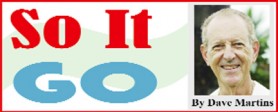If you spend only passing time reading newspaper letters or listening to people in the media, you have to notice that the quality of our pronouncements seems to be on a downward slope. It is especially bad in sports.
 Now while the mangled grammar deliveries are irksome, I am often prepared to excuse them when there is some interesting thought or humorous point being conveyed – you know, wheat among the chaff. What is truly annoying, however, is when some prominent person or assumed expert, comes before the microphone on television or radio and, in response to a pertinent matter, delivers the most banal comment as if it’s the Theory of Relativity.
Now while the mangled grammar deliveries are irksome, I am often prepared to excuse them when there is some interesting thought or humorous point being conveyed – you know, wheat among the chaff. What is truly annoying, however, is when some prominent person or assumed expert, comes before the microphone on television or radio and, in response to a pertinent matter, delivers the most banal comment as if it’s the Theory of Relativity.
During the recent West Indies/South Africa matches, the garrulous Darren Ganga was doing commentary along with an Australian announcer following another West Indian loss. Responding to a question as to why we were losing so much, Ganga said, “We’re too dependent on Chris Gayle. Nobody else on the team is coming through. We have to do something about that fast.”
To begin with, that’s an old saw. It used to be said in recent years of Shiv. Before that it used to be said about Lara, and before him, Richardson, and before him, Richards. More to the point, what can we do? This current team is the best we’ve got (okay Hinds, aside) so, despite all the heat we give the selectors, where are these other cricketers who can come in to bolster the batting lineup fast as Darren is proposing? Hiding in Harrison’s Cave in Barbados? One would hope that someone with Ganga’s experience in cricket, and with his inclination to expound, would have given us more insight than that.
A couple weeks ago, after an American basketball playoff loss, the Orlando Magic’s coach Stan Van Gundy was asked what he would say to the team after a painful loss. Said Mr. Van Gundy: “Well, you certainly need an understanding of how hard you have to play and how hard you have to fight to win. You’ve got to understand what it’s all about.” Hello. These are professional players making millions a year, in a NBA conference championship, and they don’t understand what it’s all about? That’s all their million-dollar coach can come up with?
Some time back, during the Allan Stanford 20/20 euphoria, they employed a very excitable television commentator, from New Zealand I believe, who reveled in conducting short sideline interviews during the telecast of the game. On one occasion, at the start of the Guyana/Trinidad match, he was in one of his sideline bits, pontificating on how the game might turn out, and he probably got a wind-up instruction in his earpiece, because New Zealand suddenly closed his dialogue with this: “…so the bottom line is that whoever scores the most runs will win. Back to the booth.” Cozier and Bishop were probably doubled up laughing back in the booth.
I recall an interesting USA television documentary some years ago where two scientists undertook to explain the mechanics of a basketball shot. They selected a young college player, and photographed him from a variety of angles using the most sophisticated slow-motion cameras. They attached sensors to his arms and his back and his legs to measure muscle action. They photographed him in the dark using only strobe lights as he shot. It was an exhaustive process. After their multiple calculations, the two scientists sat down with the young athlete at a computer screen, and showed him the mechanics, the release point, the muscle exertion, the arc of the ball, the rotation from his fingers – several minutes of explanation. Then one of the scientists said to him proudly, “So what do you think about this?” The athlete paused, looked at both of them and said, “I don’t know. I just shoot it and it goes in.” The scientists were floored. They kept trying to explain the mechanics, and each time the guy said, “I just shoot it, and it goes in.” I wanted to hug him.
It can be argued that professional athletes are paid to play, not to chat, and that the pressure of a championship can get to them; in that case they should think about something useful to say before coming to the interview, or, do like Barry Bonds and refuse to talk to the press. If you have nothing to say, say nothing.
Perhaps it’s my love of the game, but the inanities seem more prevalent in cricket, and they are now at the point where they are literally meaningless. I am safe in predicting that before the start of the next West Indies match, some notable, like the captain or the coach, will look into the camera and say, “The guys are confident, they are working hard, and we intend to make a good showing.” This, mind you, after they have lost six games in a row, have dropped four catches in the previous game, and two batsmen were runout dealing with wides. Confidence? Based on what?
At the end of the match, you can also be sure that some notable – Shiv or Bravo – will come to the microphone and say, “Well, we have to take some positives from this game, and some of us will have to step up to the plate.” One is tempted to point out that (a) the positives are non-existent, and (b) to step up to the plate some of our guys would need a step ladder. Another frequent and meaningless post-match West Indies comment is “We have to put this one behind us.” Considering the amount of games we have had to put behind us, that line would probably stretch from Canje to Bartica.
The other post-game inanity is the commonly heard “back to the drawing-board” suggestion. It’s laughable; every two days we’re going back to the blessed thing. Maybe the problem is that, like the missing airline tickets for the players, they just can’t find the drawing-board. Or, perhaps it’s locked in the WICB office in Antigua and only Viv Richards has the key.
Once, just once, I would like to hear our cricketers come before the mike, avoid all the stupid clichés, and tell it like it is. It’s not likely to happen, but the next time somebody asks Darren Ganga, or someone of that ilk, how to fix West Indies cricket, I would love to see Darren look left and right, lean close to the mike, and say, “Look padna. I don’t have the faintest idea, oui. Le’ we go have a cold Carib.”
I would hug him.





